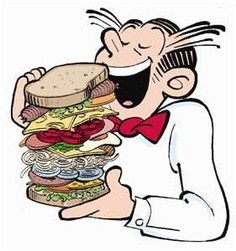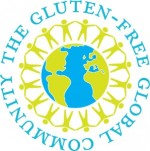Originally published in the Fall 2008 GIG Quarterly Magazine of the Gluten Intolerance Group
It’s Tuesday morning at the office and one of your coworkers waltzes up to your desk with a box of Krispy Kremes. “No thanks”, you smile. “Aah, come on”, he says. “You look like you could use a donut. And I’m not even going to charge you.” “I have celiac disease”, you reply, smirking slightly as you anticipate one of several predictable reactions from people who don’t know what celiac is. Sure enough, he eyes you suspiciously, trying to decide if that means you’re dangerous, contagious, or some sort of maniac. After a moment during which your coworker seems to be deciding if you’re going to do some sort of impromptu jig while gnawing your elbow, his eyes light up in a “eureka” moment as he asks, “does that mean you can’t have fish?”
Those of us with celiac disease and gluten intolerance are used to having to explain our condition to others. While some people respond with understanding and empathy, others may treat us badly out of ignorance, prejudice, pride, or malice. The psychological battles we face can be more challenging than the physical ones. Others may not take your condition seriously, you may face discrimination, and you may be mistreated, all because of people’s judgments of a medical condition that you did not choose to have.
In the latest estimates I’ve seen, 1 in 33 Americans carries the gene for celiac disease, 1 in 99 Americans has celiac, and 98 percent are misdiagnosed or undiagnosed. Many people with the disease are medicated for their symptoms without any effort made to find the cause. Before I was diagnosed, terms like “irritable bowel syndrome” and “spastic colon” were tossed around, but my symptoms were as serious as seizures during which I went unconscious. Those began when I was 8 years old, and thinking back I remember distinct signs of having celiac before that. But doctors back then didn’t check for celiac, and our family doctor said I’d “just grow out of it.”
I didn’t grow out of it, and my reactions became more severe. It got to a point where I felt sick all the time, and the tiredness and anxiety was crippling. I went to several different types of specialists just before my diagnosis, and they did a colonoscopy, an EEG, an EKG, a tilt table test, and so on. I was put on prescriptions that just made me sicker. People gave me a hard time about it, berating me with such gems as “it’s in your head”, or “if you’d just exercise more, you wouldn’t feel like this.”
While a couple of small, unrelated issues were found, doctors kept telling me “you’re fine” or “you’re just overly sensitive”. Sorry, but spending much of your adult life in the bathroom in terrible pain isn’t something people do for fun. Finally, at the cardiologist’s office, a doctor told me, looking down her nose disdainfully, “you just need a really good psychiatrist.”
Something inside me snapped. I had been sick most of my life and knew something was very wrong. So I made an appointment with a local naturopath that had spoken at my workplace.
The naturopath took one look at my family history and said, “your grandmother has celiac.” “Yes,” I said. “She’s known about it since I was 8. She diagnosed herself on her deathbed in the hospital, and lost one of her intestines to ulcerative colitis.” As in, duh. His next line stunned me: “do you know that it’s genetic?” I was floored. I had no idea.
All it took was a simple blood test to find this—voila, my antibodies were sky high. I had what I’d been watching Grandma deal with for 20 years. So I started reading and doing research, and quickly learned 1001 ways to eat corn tortillas. Later that year my new lifestyle was put to the test when I took a Caribbean cruise. The cruise line assured me that they could accommodate a gluten-free diet, a concept that was lost on a hard-working waiter who didn’t speak much English. The only actual accommodation I received was hard, round gluten-free biscuits that got old after a couple of days. I had to guess what I could have off the menu, so I was going to the medical station in the middle of the night. By the time we reached Barbados, I was so sick I didn’t go ashore that morning.
In 2005, still having suspicious celiac-like symptoms, I visited a new doctor who drew blood for the ELISA food allergy panel test. It turns out that I’m highly allergic to a number of other foods, including dairy, eggs, and most red meat. I also learned about some other autoimmune issues. While eliminating those foods from my diet made me feel much better, those changes unfortunately eliminated many sources of vitamins, minerals, and amino acids. A vision issue I’d already noticed began to worsen, and other strange things started to happen that I’m still trying to find answers for. However, in my search for answers, I’m greeted with that all too familiar phenomenon of specialists saying, “just learn to live with it”, “sorry, I can’t help you further”, or in the case of a gastroenterologist checking fat absorption, “some of us just don’t believe in food allergies.”
Those of us in a quest to find answers for our conditions go through uphill battles with not just our doctors, but our insurance companies. Some insurance companies don’t cover treatment by naturopaths, or pay for necessary supplements, lab work, or compounded prescriptions. Those that do can take a long time to process claims as they may take more work. Many doctors knowledgeable in the autoimmune field require payment from patients up front, which means that some people can’t get the care they need, or rack up credit card interest as their insurance company plods through their claims.
Under the Americans with Disabilities Act, food allergies can be considered a disability because of the limitations they put on people’s lives. Even so, employers may not believe that you have a disability or pass it off as not well-known enough to give you some minor flexibility to stay healthy. You may also be in a workplace situation where asking for a reasonable accommodation may make your work environment worse. You might get stuck disclosing highly personal information to a supervisor who has violated your trust, or your coworkers might become bitter because they don’t see physical evidence of your issues.
Looking for employment can also be a difficult task for people with dietary issues. At minimum, we can’t eat at all restaurants, and some of us can only eat what we prepare for ourselves. Unless we have access to a full kitchen at work (most of us don’t), then what we can bring for lunch is limited, and our health can go downhill because we’re not eating right.
Even more painful than the issues caused by doctors, insurance companies, and the workplace is how we may be treated in our personal lives. If your partner is unwilling to entertain alternatives or make accommodations for you, you may find yourself the victim of psychological or physical abuse. You may be perceived as weak, incapable, or strangely different instead of being accepted as you are.
Friends may shun you or not invite you places. They may not invite you to a birthday party at a restaurant because they “didn’t want to offend you.” Some people become overly dramatic or apologetic at gatherings where you can’t eat something (though many of them are sincere and well-meaning). Jokes can be made about your “obsessive-compulsive disorder” as you ask about how food at a potluck was prepared to avoid cross-contamination. You may face a guilt trip of epic proportions as you’re told that a relative will be terribly offended if you don’t try their green bean casserole.
Also in the social realm, dating and romance can have extra challenges for some people with special diets. People may think it’s incredibly odd that you can’t go out to dinner at a restaurant when they ask you out, or if you ask them to brush their teeth before kissing you. Thankfully many people will make simple accommodations to protect you and enjoy the rewards they get for treating you right. But there are those who don’t want to date or marry the “disabled person”, afraid of the limitations it might put on their life or afraid of what their friends think if they’re with someone “different” on beer and pizza night.
So what can we do about the discrimination, prejudice, and harassment that those of us branded for our diets face? First, remember that your diagnosis is a blessing. Sure, you have to make some adjustments and may have to limit your dining and travel. But as a result of your diagnosis you will generally eat healthier, enjoy a better quality of life, and may be spared more serious diseases and complications later in life. The average length of time that someone has celiac disease before being diagnosed is ten years, so we are well-acquainted with pain and suffering that may cease completely as we rid our diets of the foods that are poisoning us.
Second, you are now in a fantastic position to help others. Considering that there are nearly two million people in our country who have our condition and don’t know it, there is much work to be done. There is a need for educated and understanding people to advocate for and support others in the same boat. While there are doctors, restaurants, insurance companies, grocery stores, and travel companies who are on top of this, there are many more to be trained to treat us with respect and equality. This includes emergency responders, those who want and need to know more because someone they know has similar symptoms, and those who just don’t understand. Opinions are temporary, but education is permanent. Being “one of us” is a tremendous opportunity to change our society.
***************************************************
©2010 H. Hiatt/wildninja.wordpress.com. All articles/posts on this blog are copyrighted original material that may not be reproduced in part or whole in any electronic or printed medium without prior permission from H. Hiatt/wildninja.wordpress.com.

